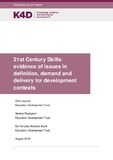| dc.contributor.author | Joynes, Chris | |
| dc.contributor.author | Rossignoli, Serena | |
| dc.contributor.author | Amonoo-Kuofi, Esi Fenyiwa | |
| dc.date.accessioned | 2019-09-03T09:16:15Z | |
| dc.date.available | 2019-09-03T09:16:15Z | |
| dc.date.issued | 2019-08 | |
| dc.identifier.citation | Joynes, C., Rossignoli, S., & Fenyiwa Amonoo-Kuofi, E. (2019). 21st Century Skills: Evidence of issues in definition, demand and delivery for development contexts (K4D Helpdesk Report). Brighton, UK: Institute of Development Studies. | en |
| dc.identifier.uri | https://opendocs.ids.ac.uk/opendocs/handle/20.500.12413/14674 | |
| dc.description.abstract | The purpose of this study is to provide a summary of the evidence related to issues associated with the definition, demand, and delivery of 21st Century Skills, with a particular focus on low- and middle-income countries (LMICs). In looking at definitions of ‘21st Century Skills’, Section 2 of this study finds that there is a broad range of available literature discussing 21st Century Skills, including a number of key synthesis studies. Within the examined literature, there is general agreement across the commentators on the need for new forms of learning to tackle global challenges. However, despite this consensus, there is no unique and single approach to the definition of ‘21st Century Skills’. In looking at the levels of demand for 21st Century Skills, evidence gathered in Section 3 suggests that the need for 21st Century Skills at the global level is dictated by a combination of factors including the change in societies resulting from the rapid spread of technology; increasing globalisation and internationalisation; and the shift from industrial social economies to information and knowledge-based social economies (Voogt & Roblin, 2010). Accordingly, evidence of demand at regional rather than the global level suggests a significant diversity in demand based on differences in developmental context. Findings presented in Section 4 suggest that approaches to the delivery of 21st Century Skills are currently impacted by ongoing discussions over the definition and understanding of 21st Century Skills (Care, Anderson & Kim, 2016). On this basis, while there is a broad range of documented interventions from around the world, many commentators conclude that it is currently little or no substantial evidence available on the most effective tools and approaches to delivering those skills. Section 5 concludes with a number of recommendations for proposed action in the development of regional and national programming for 21st Century Skills, and future research designed to strengthen the evidence base associated with levels of demand and approaches to the delivery of 21st Century Skills, particularly in LMICs. | en |
| dc.language.iso | en | en |
| dc.publisher | IDS | en |
| dc.relation.ispartofseries | K4D Emerging Issues Report;023-024 | |
| dc.rights.uri | https://www.nationalarchives.gov.uk/doc/open-government-licence/version/3/ | en |
| dc.subject | Children and Youth | en |
| dc.subject | Education | en |
| dc.subject | Globalisation | en |
| dc.subject | Technology | en |
| dc.title | 21st Century Skills: Evidence of Issues in Definition, Demand and Delivery for Development Contexts | en |
| dc.type | Emerging Issues Reports | en |
| dc.rights.holder | © DFID – Crown copyright 2019 | en |
| dcterms.dateAccepted | 2019-08 | |
| rioxxterms.funder | Department for International Development, UK Government | en |
| rioxxterms.identifier.project | K4D | en |
| rioxxterms.version | VoR | en |
| rioxxterms.funder.project | 238a9fa4-fe4a-4380-996b-995f33607ba0 | en |

